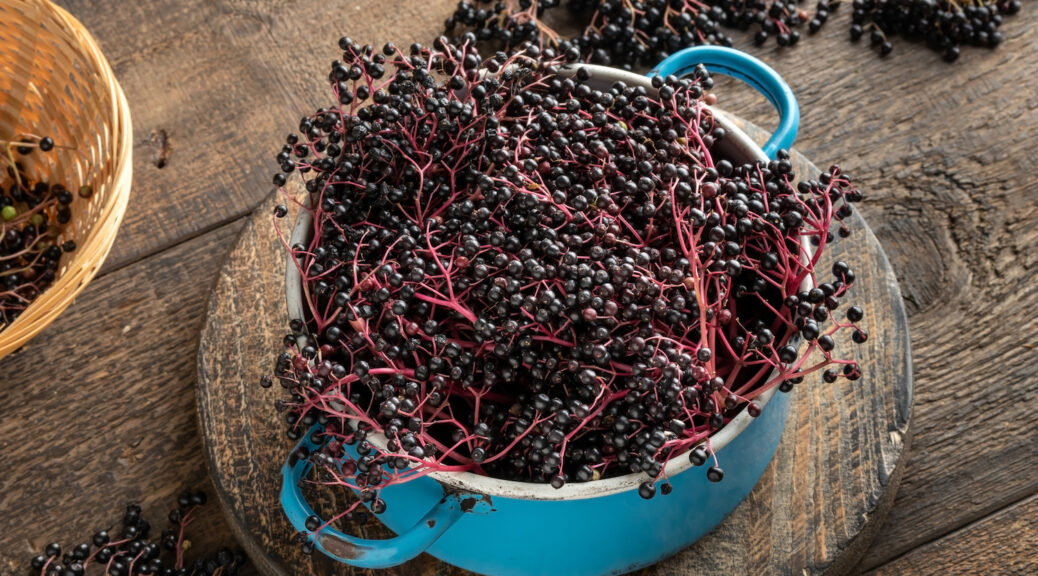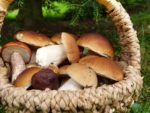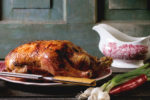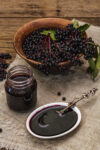
Unusual Catsups – Elderberry, Currant, Cucumber, and more…
Old cookbooks used the spellings, “catsup”, “ketchup”, and “catchup” in their recipe titles. For consistency, I used “catsup” for this post.
The only catsups I’ve tasted were made from tomatoes. The catsup recipes below are quite interesting and made from what was plentiful during the 1800s. People were sure resourceful and wanted to make their foods interesting and flavorful.
INFORMATION BELOW FROM 1800s COOKBOOKS
ELDERBERRY CATSUP
1 quart of elderberries
1 quart of vinegar
6 anchovies, soaked and pulled to pieces
1/2 teaspoon mace
A pinch of ginger
2 tablespoons white sugar
1 teaspoon salt
1 tablespoonful whole peppers
Scald the vinegar and pour over the berries, which must be picked from the stalks and put into a large stone jar. Cover with a pane of glass and set in the hot sun for two days. Strain off the liquor, and boil up with the other ingredients for one hour, stirring often and keeping it covered between stirrings. Let it cool, strain, and bottle.
This is used for flavoring brown gravies, soups, and ragouts. Stirred into browned butter, it makes a good piquant sauce for broiled or baked fish.
CURRANT CATSUP
Clean and stew four pounds of ripe currants. Add two pounds of brown sugar and one pint of vinegar. Boil steadily and slowly in a porcelain saucepan until thick. Add one teaspoon each of ground pepper, cloves, and cinnamon. Boil for five minutes longer, then strain, bottle, and seal.
CUCUMBER CATSUP
For a small quantity, take twelve fine full-grown cucumbers, and lay them an hour in cold water. Then pare them, and grate them finely down into a deep dish. Grate also six small onions, and mix them with the grated cucumber. Season the mixture to your taste, with pepper, salt, and vinegar; the vinegar must be of excellent quality—real cider vinegar. It should be the consistency of rich marmalade or jam. When thoroughly incorporated, transfer it to a glass jar, cover it closely, tying down over the top a piece of bladder,* so as to make it perfectly air-tight.
*bladder – a bladder from an animal was used to cover mincemeat, potted meat, etc., to exclude the air.
LEMON CATSUP
Cut nine large lemons into thin slices, and take out the seeds. Pound in a mortar, two ounces of mustard seed, one-half black pepper, one-half ounce nutmeg, one-fourth ounce mace, and one-fourth ounce cloves. Slice thin two ounces of horseradish and put all these ingredients together. Strew over them three ounces of fine salt and add a quart of the best vinegar.
Boil the whole for twenty minutes. Then put it warm into a jar and let it stand three weeks closely covered. Stir it up daily. Strain it through a sieve, and put it up in small bottles to flavor fish and other sauces. This is sometimes called lemon pickle.
CAMP CATSUP
Take a pint or quart of strong ale and a pint of white wine, half a dozen shallots or very small onions, peeled and minced, one-half ounce of mace, one-half ounce nutmeg, broken up, and two large roots of ginger, sliced. Put all together into a porcelain-lined kettle, and over a moderate fire, boil it slowly till one-third of the liquid is wasted. Next day, transfer it to small bottles, putting a portion of the seasoning in the bottom of each, and filling them to the top with the liquid. Finish with a teaspoon of salad oil at the top. Cork the bottles with good corks, and seal them. In a dry place this catsup will keep for years.
APPLE CATSUP
Peel and quarter a dozen sound, tart apples. Stew them until soft in as little water as possible, then pass them through a sieve. To a quart of the sifted apple, add a teacup* of sugar, one teaspoon pepper, one of cloves, one of mustard, two of cinnamon, and two medium-sized onions, chopped very fine. Stir all together, adding a tablespoon of salt and a pint of vinegar. Place over the fire and boil one hour. Bottle while hot and seal very tight. It should be about as thick as tomato catsup, so that it will just run from the bottle.
*teacup – same as a jill or gill; four ounces in the U.S. and five ounces in the U.K.
GREEN TOMATO CATSUP
Take one peck* of green tomatoes and two large onions sliced. Place them in layers, sprinkling salt between. Let them stand twenty-four hours and then drain them. Add one-fourth pound of mustard seed, one ounce allspice, one ounce cloves, one ounce ground mustard, one ounce ground ginger, two tablespoons black pepper, two teaspoons celery seed, and one-fourth pound of brown sugar. Put all in preserving-pan, cover with vinegar and boil two hours. Then strain through a sieve and bottle for use.
*peck – measurement for dry volume; a peck is two gallons or eight dry quarts. Four pecks make a bushel.
WALNUT CATSUP
Choose young [black] walnuts tender enough to be pierced with a pin or needle. Prick them in several places, and lay in a jar with a handful of salt to every twenty-five, and water enough to cover them. Break them with a billet of wood or wooden beetle,* and let them lie in the pickle a fortnight,* stirring twice a day.
Drain off the liquor into a saucepan, and cover the shells with boiling vinegar to extract what juice remains in them. Crush to a pulp and strain through a colander into the saucepan. Allow for every quart an ounce of black pepper and one of ginger, one-half ounce of cloves and one-half ounce of nutmeg, beaten fine. Put in a pinch of cayenne, a shallot minced fine for every two quarts, and a thimbleful of celery seed tied in a bag for the same quantity. Boil all together for an hour. Bottle when cold, putting an equal quantity of the spice in each flask. Butternuts also make delightful catsup.
*beetle – a wooden kitchen utensil about twelve inches long, used to mash food.
*fortnight – a period of two weeks.
MUSHROOM CATSUP
Arrange layers of mushrooms and salt in a preserving kettle. Let it stand on the back of the stove for twelve hours, then press through a sieve. For each quart of mushroom liquor, add one pint vinegar, one tablespoon salt, and two tablespoons each of cloves, allspice, mace, and mustard seed. Boil until thick, then bottle.
OYSTER CATSUP
1 quart oysters
1 tablespoon salt
1 teaspoon cayenne pepper, and same of mace.
1 teacup cider vinegar.
1 teacup sherry.
Chop the oysters and boil in their own liquor with a teacup of vinegar, skimming the scum as it rises. Boil three minutes and strain through a hair-sieve. Return the liquor to the fire, add the wine, pepper, salt, and mace. Boil fifteen minutes and when cold, bottle for use, sealing the corks.
*hair sieve – a strainer with a wiry fabric bottom usually woven from horsehair.
Image from Deposit Photos
=================================================
Have you ever made catsup or your own sauces? Please leave a comment below.
=================================================



